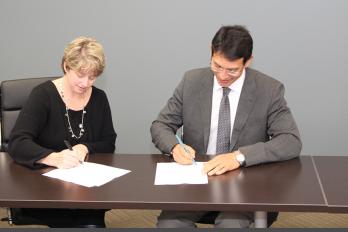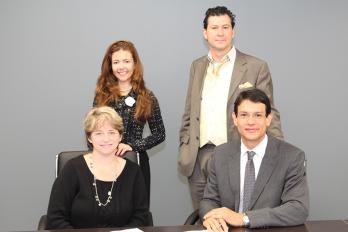TJSL Helps San Diego and São Paulo Bar Associations Join Hands
February 5, 2013
The San Diego County Bar Association (SDCBA) and Brazil’s São Paulo Bar Association have come to a new cooperation agreement that was arranged by Thomas Jefferson School of Law.
The agreement was signed on Friday January 25 at the bar associations’ beautiful new offices at 401 West A Street by the SDCBA Executive Director Ellen Miller-Sharp and George Niaradi , the Counsel for International Affairs of the São Paulo Bar Association.
TJSL has very a strong connection to the Brazilian legal community, and hosts groups of Brazilian attorneys twice a year at the law school to study the U.S. legal system, under the Legal Education and Exchange Program (LEEP.)
“Thomas Jefferson School of Law and LEEP have given all the support to make this cooperation agreement possible,” said Carla McEwen, director of the LEEP Program at TJSL.
“Through our meetings with the São Paulo Bar, we’ve recognized that many of the initiatives and programs of the San Diego County Bar Association mirror those of the São Paulo Bar,” said SDCBA’s Miller-Sharp. “We are proud to help expand São Paulo’s programing and our own as we work together to address issues of common concern to both of our memberships and to citizens of both San Diego and Sao Paulo. This is an exciting time for our organization, and we look forward to exploring all of the opportunities this new partnership brings.”
“This is an opportunity for our young lawyers to learn more about the U.S. legal system,” said Niaradi. “
According to Carla McEwen, “This agreement will reinforce LEEPs’ philosophy that aims to minimize the stress in the legal cross culture differences also expands San Diego and São Paulo Bar members’ legal knowledge.”
The two bar associations will be hosting events and exchanging lawyers to promote both knowledge and understanding of member of both bar associations of each county’s legal systems – which are very different, with Brazil’s system being based on Napoleonic Law.
“Today we build a structure for cooperation between two important international law institutions hoping one day we can reach a globalization where there will be a structure for an International Court of Law serving all the citizens in the world. We will continue exchange legal knowledge and eliminating legal cross culture issues with the ultimate goal of a global understanding of human rights and justice.,” said McEwen.

